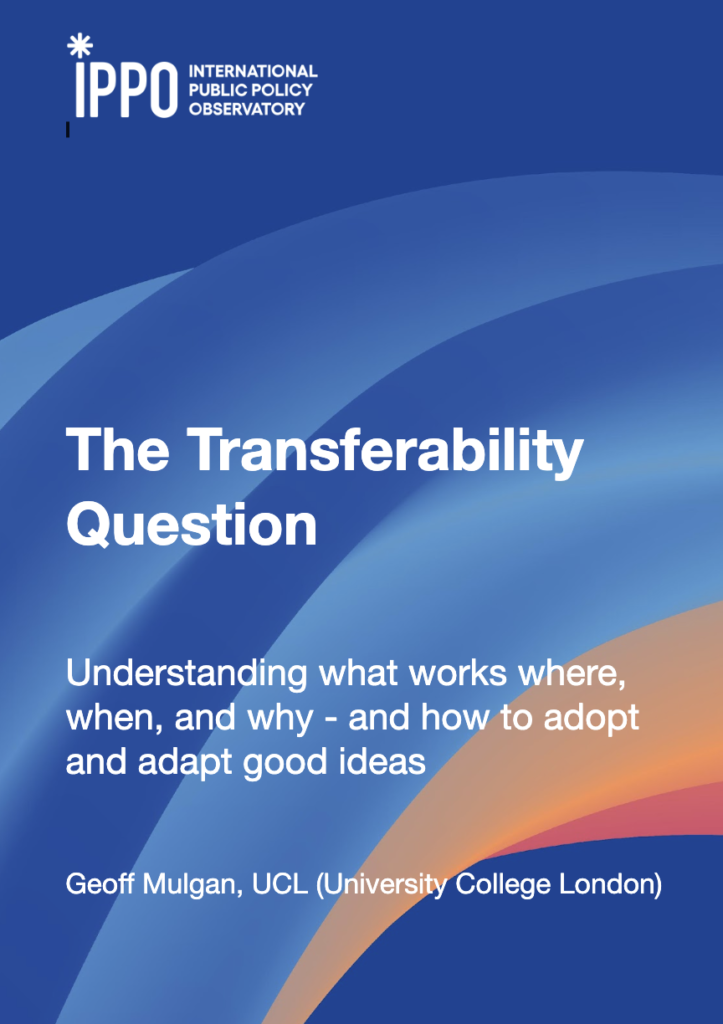The Transferability Question

Understanding What Works Where, When, and Why – And How To Adopt and Adapt Good Ideas
Geoff Mulgan
How should we think about the transferability of ideas and methods? If something works in one place and one time, how do we know if it, or some variant of it, will work in another place or another time?
This – the transferability question – is one that many organisations face: businesses, from retailers and taxi firms to restaurants and accountants wanting to expand to other regions or countries; governments wanting to adopt and adapt policies from elsewhere; and professions like doctors, wanting to know whether a kind of surgery, or a smoking cessation programme, will work in another context.
Please download the full report below.

It’s Not A New Question
The challenge was faced in different forms by institutions as varied as the Roman and British Empires, the Catholic Church and the Caliphate, and more recently by campaigning groups like Greenpeace and global corporates like McDonald’s. Could they just replicate a single model – or should they adapt everything to local conditions, cultures and values?
The question is cast in a new light by the accumulation of evidence of all kinds, by ubiquitous data, and new tools that can automatically synthesise knowledge. We bother with evidence because of an assumption that it is in some senses transferable. Science would fall apart if chemistry and physics meant different things in different places, and usually we can be confident that if a medical procedure works with one kind of human it will work with others. The premise of ‘evidence-based policy’ is that evidence gathered in one context will be relevant to action in others.
But even with material objects transferability may not be straightforward. A machine that works perfectly in Manchester or Munich may fail elsewhere, perhaps because of sand in the air, or levels of humidity. For policies and actions that involve human beings, transferability may be very complex. It would be surprising if the same action would have the same effects in the very different contexts of, for example, Denmark, Paraguay, China and Saudi Arabia (a useful recent survey looks at the limits of transfer of scientific knowledge, particularly in relation to agriculture, and ‘when research over there isn’t useful here’).
So, the question turns out to be far from straightforward, and although there is some – but not that much – academic and policy literature on transferability (some listed at the end of this piece) there is no simple formula that can tell you how transferable a model is.
Here I draw on this literature to suggest not so much a generalisable method but rather an approach that starts by asking four basic questions of any promising idea:
- SPREAD: has the idea already spread to diverse contexts and been shown to work?
- ESSENTIALS: do we know what the essentials are, the crucial ingredients that make it effective?
- EASE: how easy is it to adapt or adopt (in other words, how many other things need to change for it to be implemented successfully)?
- RELEVANCE: how relevant is the evidence (or how similar is the context of evidence to the context of action)?
Asking these questions is a protection against the vice of hoping that you can just ‘cut and paste’ an idea from elsewhere, but also an encouragement to be hungry for good ideas that can be adopted or adapted.
I conclude by arguing that it is healthy for any society or government to assume that there are good ideas that could adopted or adapted; it’s healthy to cultivate a hunger to learn; healthy to understand methods for analysing what aspects of an idea or model could be transferable; and great value in having institutions that are good at promoting and spreading ideas, at adoption and adaptation as well as innovation.
Please join our event on December 6th, 2023 to discuss these ideas. Sign up here. Also, find out more about our series on innovations in evidence here.
